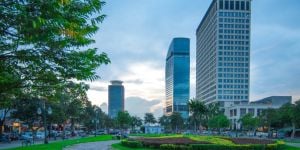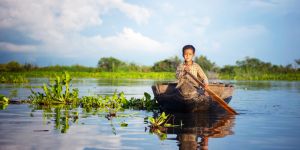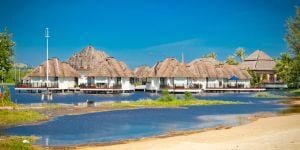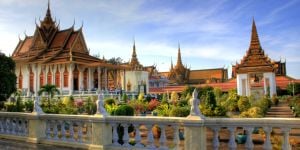Donating to an Orphanage
Subscribe to the topic
Post new topic
Hi Expats
We were wondering what the best way to make a donation to an orphanage in Cambodia would be. We know about dodgy orphanages and the corruption involved so how can we be sure our money goes to the children that need it most?
Thanks
John and Julie
Its a good question. Alas most people who donate want to get something for their money - meet the children, see the facilities, talk to the administrators, get a tour, buy some art, watch the kids dance - basically ignorant "Voluntourists".
The truth is, few legitimate "orphanages" will allow an unauthorised person to do any of these things. And the rest? Many of the kids are not orphans at all, just being shown as such by the operators to make them more money.
There are a few resources you can check which will help you find and choose a legitimate cause:
http://www.thinkchildsafe.orghttp://www.childsafetourism.org
Alternatively I am posting from an NGO here in Siem Reap, Life and Hope Association. We do not have an orphanage, but among the 5 programs we run to help the poor and uneducated of Cambodia, we have a Children's Development Village out of town where children from disadvantaged households and villages live, are cared for by 'houseparents' and eat properly, are clothed, educated etc and then when they 'graduate' they return to their village better prepared to help their community in a sustainable and positive way.
Derek Green.
Ask to see a copy of their accounts. Any legitimate charity should have these showing where the money goes. Or ask if they have an MOU with the Ministry of Social Affairs.
Hello.
In TEACH How to Fish project, we believe that the best philanthropy is the one that seeks to end the system that perpetually generates the need for more philanthropy.
Volunteers are fueling the growth of orphanages in Cambodia, and thats why we must explain to you all how this can happen and help you helping those in need. Evidence has shown that institutional or residential care centers to give orphanages their correct name can have a severely detrimental effect on a childs welfare, and child protection charities, academics and professionals have long advocated an alternative model where an emphasis is firmly placed on care within a family unit. Family units that many of these children are taken away from to fill up the orphanages for the volunteers benefit! All children need a stable environment with adults who are there long term to provide the care, protection and education they need.
They do not need a bunch of bleeding heart volunteers who are only there long enough to take a few selfies and get a nice Facebook profile pic to brag about when they get home.
We believe in empowerment as the solution to end poverty. As volunteers, we believe that together we can end extreme poverty and we will work hard to achieve it, by creating a community that allows you to establish exchange of ideas, a network of contacts with different Knowledge and the use of 100% of all donations to help people. We want to gather the means to free education for poor children and training of their families, in areas such as agriculture, for example, to ensure self-sustenance and to respect their culture as their own environment.
Dignity, Labor, Education, Health and Love to ALL.
THE VALUES:
The Project values are, of course, the values of those who formed the project and which daily contribute. In fact and till now, we have been surrounded and supported by people whose conduct is precisely what we seek on people who want above all to contribute, absolutely voluntarily, with love, to help us to improve the lives of the poorest and most vulnerable children, and their families. Love for help other, Truth, Ethic, Transparency, Work, Responsibility, Integrity, Respect for Culture and for Diversity and solidarity, are the main values that we will always want present in people who are with all the children and families to represent the project Teach How to Fish.
THE GOALS: The project is divided into two different fronts: children and their families. In this case our mission is to give to the families some training, support and follow up until they have full autonomy and are no longer vulnerable of small charity or emigrating to obtain sustenance.
We believe it is essential to support children's parents / caregivers in order to improve their life.
On the other hand we want to ensure that the poorest children will always have access to education, school extra support, basic hygiene and health care, and access to sports, arts and crafts, as introduction to some agriculture issues.
We started our project at Siem Reap, Cambodia, in Chen Raom village at Tuek Vill Commune, and with the non profit Kindergarten Siem Reap, a place where children can access, play, learn, and use all the school supplies and have extra-school support for free.
CHILDREN, PUBLIC SCHOOL AND EXTRA SCHOOL SUPPORT: Education is the main focus of the project for children, hand in hand with nutrition and health. At this level, the public school is a key role to ensure continuity and development of children in education, own educational equivalencies.
Our work relates to solutions that allow all children access to public school, creating extra school support in places near their residence. The intention is precisely that children attend to these school support to do their homework, study, practice English, practice sports, have access to various initiatives and activities (painting, dance, etc.) and socialize. We want to ensure that all children will have access to these areas, with safety and comfort. Also all materials that they need to use during their stay will be available 100% for free and in the presence of volunteers.
THE FAMILIES AND THE VILLAGE: Empowerment is the process that ensures opportunities and autonomy to people in need, either directly through these people like to help others as from who share access to these same opportunities. Empowerment also includes the encouragement and development of knowledge that will enable self-sufficiency, in order to eliminate the charity and the vulnerability of people in these groups.
This process is always difficult to start and to implement efficiently, however it is our focus and is what we propose, once fully believe it is the right one. Formation, Investment and Follow up.
Thus in addition to autonomy, empowerment and work, families stay together, children have the company of parents who do not migrate, food and access to health care and education.
HYGIENE, CLEANING AND HEALTH CARE: Many of the existing infectious diseases that are found in inappropriate places resulting from low hygiene standards today are somewhat contained with the implementation of hygiene standards, through the awareness of the population and new methodologies that teach education as society should behave in these times regarding their hygiene. There are four types of hygiene: The personal, collective, mental and environmental.
The personal includes the hygiene and cleanliness that we take care of our daily as bathing, hand washing, oral hygiene and drink bottled or filtered water.
The collective hygiene is the set of rules designed to prevent diseases and to preserve the lives of everyone.
Environmental hygiene is a concept related to the preservation of the sanitary conditions of the environment in order to prevent this harm the health of human beings. It includes, for example, take care of the garbage, sweep the house, washing food before eating, etc.
These are three aspects that we intend to deepen with the children and their families from of Chen Raom village.
HOUSES REBUILDING AND ACCESS IMPROVEMENT: Earlier this year, in January, we have stayed 2 weeks in the village and started the project: improvement of school infrastructure, survey the wills and needs of the families, the local guidelines, and now we already have the project new version with this new basic goals.
Housing _ Together, we aim to built safer homes. In a poor village, where houses have 2 square meters for 5 people, the challenges are big. Housing challenges are: to find a modular and versatile solution at the best price, which should occupy a small area on the ground and his replication has to be easy and smart. Also, should use local materials, available in Siem Reap in order to minimize the shipping price. This is the point where we need most part of the financial investment.
Food _ Together, we aim to produce quality food. We are now beginning to cultivate our first vegetable garden and also to buy the first animals to feed. In October we will have the opportunity to buy a farming kit for each family in order to have the necessary tools to work, as to buy seeds and animals, and then we cover all the families with whom we started the project there.
Health and Hygiene _ Together, we aim to protect children's health and prevent some diseases. For example caused because there aren't any hygiene basics habits, because they use no shoes most of the time (including when walking on dirty waters, garbage, etc), because of the garbage is left in the open land for many days before they burn it, or because they don't have the correct eating habits or suffer from nutritional deficiencies. So we need to clean the village with the locals, create some garbage spots, find a solution to the shoes problems. We hope to resolve the food subject with the above Food point.
Education _ Together, we aim to improve learning conditions and work on the conditions that will allowed children to public school access and also have the necessary extra school support and follow-up. At the nonprofit school Kindergarten Siem Reap, where they have full extra school support for absolutely free, we already integrated solar panels to ensure continuous lighting in the working rooms, in the bathroom and in the library. They have already school supplies donated, a playground that we build last January, and sports supplies, but we need now to guarantee volunteers helping and teaching the volunteer local teachers, and we want to make a small farm where they can start to learn farming's essentials.
#STEP BY STEP | REQUIREMENTS RELATED
rebuilding the houses
lands to start farming
introduction to agriculture and permaculture
materials necessary to start agriculture (and other tools)
family market: small market in the village
cleaning of roads and access
house to save the village tools - Community
water filters
lighting of the village
a clean and safe place to cook - for each family
the village and school entry recovery: we intend that can be visible from the entrance the image we want to give from the school and the village
These are some simple tips on how to give back the right way:
Support the programs help families stay together and promote family based care
Spread awareness to your network about the real dangers of orphanages volunteerism
Donate to our mission and help us to achieve the costs related to this demands
Contribute to our mission initiatives as you travel
THANK YOU SO MUCH.
Any questions please feel free to contact me or visit our facebook page www.facebook.com/teachhowtofish.
Articles to help you in your expat project in Cambodia
 Working in Phnom Penh
Working in Phnom PenhWhen it comes to expat living, Phnom Penh has it all. Thanks to an influx of foreign investment over the past ...
 Living in Phnom Penh
Living in Phnom PenhBefore going to anywhere in the world, people always try to find out about those places first. Likewise, before ...
 Lifestyle in Cambodia
Lifestyle in CambodiaIf you are about to settle in the Kingdom of Cambodia, you are probably wondering about its inhabitants' ...
 Student life in Phnom Penh
Student life in Phnom PenhAdjusting to life as a student can be difficult. Even more so if you are trying to do it in a new country, but ...
 Opening a bank account in Cambodia
Opening a bank account in CambodiaAs a foreigner living in Cambodia, opening a bank account is relatively straightforward and can save you quite a ...
 Developing your social circle in Phnom Penh
Developing your social circle in Phnom PenhMoving to a city where you have no friends or family can be daunting. Thankfully, Phnom Penh has a large and very ...
 Buying a property in Cambodia
Buying a property in CambodiaIf you're looking to buy a property in Cambodia — either for your personal use or as an investment ...
 Accommodation in Cambodia
Accommodation in CambodiaFinding accommodation in Cambodia can be quite challenging. But the recent rise of rental websites, such as ...
Find more topics on the Cambodia forum



